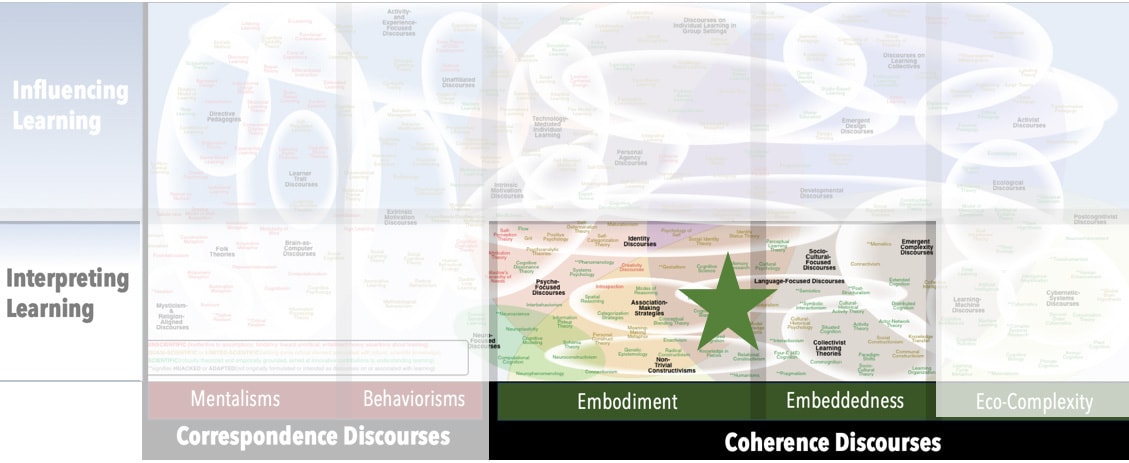AKA
Methodological Pragmatism
Focus
Interpreting truth in term of practical application rather than transcendent claimsPrincipal Metaphors
- Knowledge is … what works
- Knowing is … fitting action
- Learner is … a system of propositions (personal, social, cultural)
- Learning is … adapting; maintaining coherence
- Teaching is … challenging
Originated
1870sSynopsis
Pragmatism is a perspective on knowledge that, coarsely put, interprets truth in terms of “what works.” Within Pragmatism, learning and thought are not about internal representations of external reality, but about ever-evolving, experience-based webs of interpretation that channel perceptions, frame actions, enable predictions, and support problem solving. Language, science, beliefs, mathematics, and so on are all understood in terms of their practical uses – not as labels or objective truths, but as coherences and useful shared fictions. Pragmatism has many subdiscourses and associated discourses, including the following listed chronologically):- Realpolitik (Ludwig van Rochau, 1850s) – a pragmatic, results-driven approach to influencing others and making decisions that prioritizes practical considerations over ideology or morality. Realpolitik often involves strategic maneuvering, compromise, and power dynamics to achieve objectives.
- Instrumentalism (Pierre Duhem; early 1900s) – Sharing Pragmatism’s emphasis on utility, within Instrumentalism, the value and usefulness of an idea is understood in terms of its effectiveness in interpreting and predicting phenomena. That is, concepts are not seen as literal characterizations of phenomena, but as means to interpret and tools to engage with phenomena. Associated discourses include:
- Instrumental Approach (Instrumentation; Instrumentalization) – the viewing of cognitive processes and mental states as tools or instruments for achieving practical goals, rather than focusing solely on their intrinsic nature or metaphysical status. This perspective emphasizes the utility and functionality of cognitive systems in explaining and predicting behavior.
- Neopragmatism (Post-Deweyan Pragmatism; Linguistic Pragmatism; Analytic Pragmatism) (Donald Davidson, Hilary Putnam, W.V.O. Quine, Richard Rorty; 1960s) – Focused more narrowly on language, and concerned explicitly with word meaning, Neopragmatism asserts that it is a function of how they are used and what they trigger/occasion, rather than what dictionaries say or what speakers intend.
- Critical Pragmatism (various authors; 2000s) – Aimed at recovering (or amplifying) the critical dimensions of John Dewey’s version of Pragmatism, Critical Pragmatism emphasizes commitments to democratic citizenship, critical reflection, and social justice.
Commentary
Criticisms of Pragmatism tend to revolve around its apparent conflation of fact and fiction. Usually, these criticisms reject the assertion that facts are explanatory systems that consistently work, whereas known fictions present gaps or inconsistencies. Another major cluster of criticisms argue that Pragmatism is potentially relativistic – that is, it runs the risk of casting each person’s, social group’s, or culture’s unique system of truths as equally valid.Authors and/or Prominent Influences
William James; John Dewey; Charles Sanders PeirceStatus as a Theory of Learning
Pragmatism is more often described as a theory or knowledge (or truth) than a theory of learning. However, the theory attends to how systems of knowledge change – that is, how systems learn – and so it’s not unreasonable to characterize Pragmatism as a theory of learning.Status as a Theory of Teaching
Pragmatism is not a theory of teaching.Status as a Scientific Theory
Pragmatism satisfies our criteria of a scientific theory, in part because at aligns strongly with evidence generated within Cognitive Science and related domains.Subdiscourses:
- Critical Pragmatism
- Instrumental Approach (Instrumentation; Instrumentalization)
- Instrumentalism
- Neopragmatism (Post-Deweyan Pragmatism; Linguistic Pragmatism; Analytic Pragmatism)
- Realpolitik
Map Location

Please cite this article as:
Davis, B., & Francis, K. (2025). “Pragmatism” in Discourses on Learning in Education. https://learningdiscourses.com.
⇦ Back to Map
⇦ Back to List
